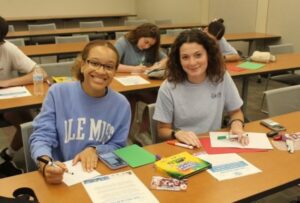
Love Does, a community-based club whose Oxford chapter was founded by Anna Claire Chappelle, a graduate student pursuing a masters degree in business administration, organized and conducted a Christmas letter drive for children in orphanages in Honduras.
The campaign, led by club member Chance Marlowe, a freshman accountancy major, invited participants to write letters before the Dec. 2 deadline.
“This club is centered around doing a fundraiser or event where everyone can help give back to the community,” Marlowe said.“I came into this club seeing an opportunity to do something for the orphanage in Honduras I have been to (for) the past two years with my church.”
Marlowe connected with Casa Hogar, an orphanage housing 32 children, to collect the information needed for the project. While most of the orphanage’s children are bilingual, Marlowe said that writing in their native Spanish language would add meaning to the letters.
Julia Emilia Bussade, director of Spanish and Portuguese at the University of Mississippi, shared her experience as an immigrant from Brazil and the impact of receiving a letter in one’s native language.
“In 1994, during my very first year in this country as an immigrant, I could not go to my native (country of) Brazil because of Visa restraints,” Bussade said. “International faculty often face similar challenges as students, including homesickness and loneliness. It was not different for me.”
Bussade said that gestures like these letters bridge emotional gaps for international students, creating a sense of belonging during difficult times.
“A personal connection, such as receiving a heartfelt letter in their native language, can remind students of home and provide emotional warmth. It also serves as a cultural affirmation since it validates their identity and acknowledges their unique experiences,” Bussade said. “A heartfelt letter in my native language could have brought solace and a sense of belonging.”
Sarah Hall, an international student advisor at the university, echoed Bussade’s sentiments.
“For many students, this might be their first time in the U.S., and that unfamiliarity both inside and outside the classroom accompanied by separation from their loved ones can often feel overwhelming,” Hall said. “I think any sort of communication done in an international student’s native language will have a positive impact on them.”
Hall also pointed out the university’s resources to help international students feel at home during the holidays.
“When advising students that are struggling with loneliness, feeling disconnected or stressed, I always remind students that our office will support them in any way we can and that the University has a wide range of services available to students that find themselves in a challenging time of their life,” Hall said.
Bussade also encouraged students to build a support system through joining clubs and maintaining their cultural roots, citing examples like the Department of Modern Languages’ Trivia Night and local cultural events like Mississippi Day.
Bussade highlighted how important community is at UM and how international students play a large role in building it.
“It is essential that international faculty, staff and students know that we bring such a unique perspective and energy to our campus, and our presence enriches all of us,” Bussade said. “The sense of belonging cannot and should not be ignored.”
The letter drive complements another initiative by the club this semester: a teddy bear drive and card drive in the Oxford area, which concluded on Nov. 20. The purpose of this drive was to provide Christmas cheer to children who “need more love this season.”
For Marlowe, Love Does embodies the power of small actions to create meaningful change in communities around the world.
“Love Does is a perfect example of the fact that you can do something small and make a huge impact on your community,” Marlowe said.


























